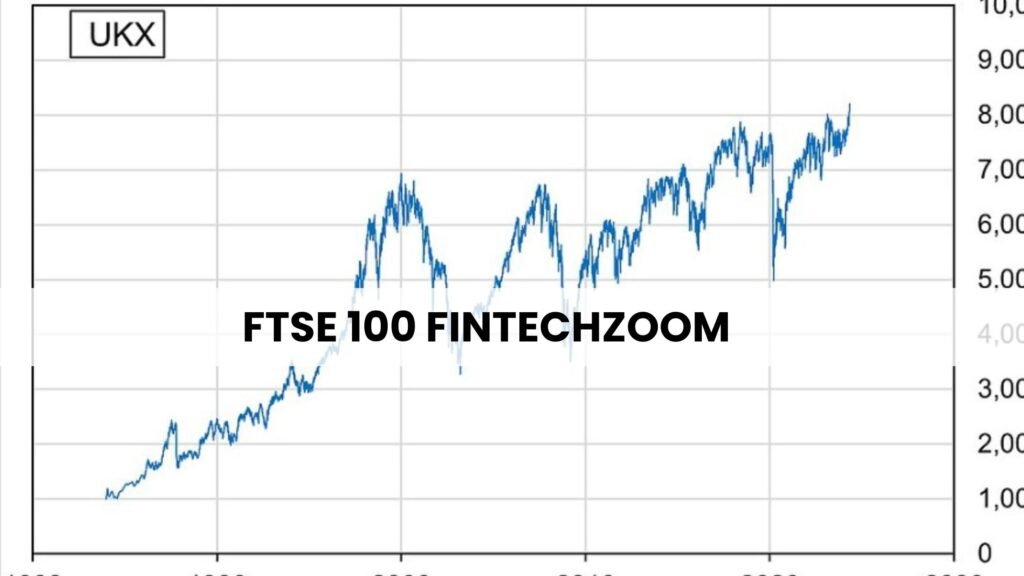The FTSE 100 FintechZoom represents a fascinating intersection between traditional finance and cutting-edge technology. The FTSE 100, a benchmark index of the 100 largest companies on the London Stock Exchange, plays a crucial role in the global financial landscape. Meanwhile, FintechZoom is a dynamic platform that uses advanced technologies like artificial intelligence and machine learning to analyze financial data in real-time. Together, they provide investors with a powerful tool for understanding market trends and making informed decisions. This article explores the components, impact, and future of the FTSE 100 FintechZoom, offering valuable insights into its relevance in today’s financial world.
Table of Contents
Understanding the FTSE 100 Index
The FTSE 100 Index is a cornerstone of the UK stock market, representing the 100 largest companies listed on the London Stock Exchange by market capitalization. It serves as a gauge for the overall health of the UK economy, providing insights into investor sentiment and market trends. The index includes a diverse range of companies, from traditional banks like Barclays and HSBC to consumer giants such as Unilever and Tesco. This diversity makes the FTSE 100 a comprehensive reflection of the UK’s economic landscape.
The FTSE 100’s influence extends beyond national borders, acting as a bellwether for global investors. Many companies within the index have significant international operations, further enhancing their impact on the global stage. For instance, companies like BP and Shell are major players in the energy sector, with operations spanning multiple continents. The FTSE 100’s composition is reviewed quarterly, ensuring that it remains representative of the leading companies and adjusts to shifts in market dynamics.
FintechZoom and Its Role in Financial Analysis
FintechZoom is a powerful platform that revolutionizes financial analysis by leveraging advanced technologies such as artificial intelligence (AI) and machine learning. Unlike traditional financial analysis methods that often rely on historical data, FTSE 100 FintechZoom provides real-time analytics, enabling investors to make timely and informed decisions. This immediacy is crucial in today’s fast-paced markets, where conditions can change rapidly. By utilizing AI and machine learning, FintechZoom sifts through vast amounts of data to identify patterns and trends that might be overlooked by human analysts.
One of the standout features of FintechZoom is its user-friendly interface, which allows both experienced investors and newcomers to easily navigate complex financial data. The platform’s dashboards are customizable, enabling users to tailor the information displayed according to their specific needs. This customization helps investors focus on the most relevant data, enhancing the efficiency and effectiveness of their analysis. Additionally, FintechZoom’s predictive analytics offer forecasts of future market trends, giving investors a strategic advantage by highlighting potential opportunities and challenges.
The Intersection of Fintech and the FTSE 100
The intersection of fintech and the FTSE 100 has led to significant changes in the financial landscape, with fintech companies increasingly playing a pivotal role in the index. Companies like Revolut and Monzo have emerged as key players within the FTSE 100, demonstrating rapid growth and innovation. These firms leverage technology to offer agile and user-friendly financial services, challenging traditional banking models and setting new standards for customer experience.
The impact of fintech on the FTSE 100 is multifaceted, driving both innovation and competition. Fintech companies within the index often focus on enhancing financial inclusion by providing services such as mobile banking and peer-to-peer lending, which are accessible to a broader audience. This shift not only benefits consumers but also spurs traditional banks to innovate and adapt, ensuring they remain competitive in a rapidly evolving market. The dynamic nature of fintech and its integration into the FTSE 100 reflects a broader trend towards digital finance, highlighting the sector’s potential to reshape the financial industry.
Challenges and Opportunities in the Fintech Sector
The fintech sector within the FTSE 100 presents both challenges and opportunities. One of the primary challenges is navigating the complex regulatory landscape. Fintech companies must ensure compliance with existing regulations while anticipating future changes, which requires ongoing engagement with regulators and a proactive approach to compliance. Additionally, the rapid pace of technological innovation poses challenges, as companies must continually adapt to new technologies while maintaining stability and security.
Despite these challenges, the fintech sector also offers significant opportunities for growth and investment. The increasing demand for digital financial services and the rise of alternative lending models present avenues for expansion. Moreover, the sector’s focus on environmental, social, and governance (ESG) factors aligns with broader market trends, enhancing its appeal to investors. As fintech companies continue to innovate and disrupt traditional financial models, they are well-positioned to drive change and capitalize on new opportunities within the FTSE 100.
Economic Indicators Affecting the FTSE 100
Several economic indicators play a critical role in influencing the FTSE 100, reflecting the broader health of both the UK and global economies. Interest rates, controlled by the Bank of England, are a key factor, as they affect borrowing costs and consumer spending. Lower interest rates can stimulate investment and boost corporate profits, while higher rates may lead to reduced spending and investment. The current environment of moderating interest rates presents potential benefits for companies within the FTSE 100 FintechZoom .
Inflation is another important indicator, as it can erode purchasing power and impact profit margins. While rising inflation may negatively affect stock prices, certain sectors within the FTSE 100, such as commodities and real estate, may benefit by passing increased costs to consumers. Geopolitical events, such as Brexit, also significantly influence the index, creating uncertainty or stability depending on the nature of the developments. Understanding these indicators and their effects on the FTSE 100 FintechZoom is crucial for investors seeking to make informed decisions.
Investment Strategies for the FTSE 100 FintechZoom
Investing in the FTSE 100 FintechZoom offers various strategies tailored to different financial goals and risk tolerances. Long-term investors may find value in index funds or ETFs that track the FTSE 100, benefiting from the historical growth trends and dividend yields of well-established companies. This approach allows investors to gain broad exposure to the UK’s largest firms with a single transaction, enhancing returns through the power of compounding.
For those interested in short-term trading, the FTSE 100’s volatility provides opportunities to capitalize on quick price movements. Techniques such as swing trading or day trading require a keen understanding of technical analysis and market sentiment. Investors might also consider sector-specific investments, focusing on industries like technology or green energy that align with current economic trends. Defensive investing, which involves selecting high-yield stocks in less sensitive sectors, offers a way to preserve capital and earn income during uncertain market conditions.
Conclusion
The FTSE 100 FintechZoom embodies the dynamic synergy between traditional finance and modern technology, offering a comprehensive platform for analyzing and understanding market trends. As fintech companies continue to innovate and disrupt traditional financial models, their integration into the FTSE 100 reflects a broader shift towards digital finance. This intersection presents both challenges and opportunities, requiring investors to stay informed and adapt their strategies to navigate the evolving landscape.
Read More : Claudia Heffner Peltz







